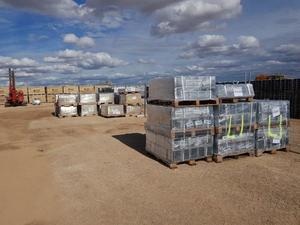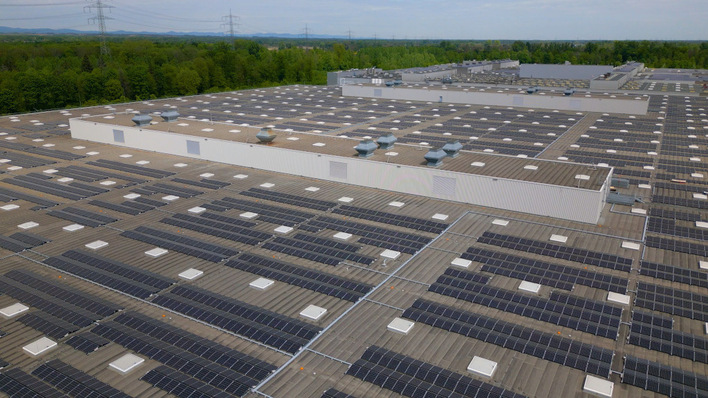In the southern Spanish province of Castile-La Mancha, construction began at the end of October 2019 on a large-scale photovoltaic installation on a 90-hectare green field site. With over 105,000 PV modules, the solar park will generate over 80 million kilowatt hours of climate-friendly power every year. This corresponds to the electricity consumed by around 22,600 three-person households. The subsidy-free photovoltaic plant is being built by the German company Athos Solar. “The solar power generated saves around 41,500 tonnes of CO2 every year,” explains Christian Linder, Managing Director of the photovoltaic company. According to the project plan, the 40-megawatt peak installation will be connected to the grid in the spring of 2020, after a construction period of around six months.
25 percent more yield with trackers
Due to a decrease in investment costs and high solar irradiation, the electricity market in Spain is one of the first where photovoltaics is cheaper than all other forms of power generation. “Southern Spain is one of the regions in Europe with the highest level of solar irradiation. The solar power yields are correspondingly high and make photovoltaic plants a very good, sustainable infrastructure investment,” says Christian Linder. The yield is further increased by using monocrystalline photovoltaic modules, which have a high degree of efficiency. The modules are also installed on tracking systems. The single-axis trackers follow the path of the sun. As a result, the yields can be increased by around 25 percent. The solar park, which will be installed on an area that is the equivalent of around 130 football fields near the town of Albacete is the first to be built by Athos Solar in Spain.
Fast project completion and short construction phase
The plan is to complete the construction of the entire plant by the second quarter of 2020. “Our strategy is to use short internal decision-making paths and our long-term collaboration with the general contractor who developed the project and is constructing the photovoltaic plant,” explains Christian Linder, with reference to the period of just one year between the purchase of the project rights and the planned grid connection.
The solar plant will initially be connected to the public power grid via a private 132-kilovolt (kV) transformer substation and then via a 400 kV transformer substation that is part of the public infrastructure. The 400 kV transformer substation has the largest transformer currently installed in Spain. Over time, renewable energy plants with an installed capacity of 800 megawatts in total will be connected to it. The large solar park is located in part of an area specifically developed for the use of renewable energies.

Generated power sold to the electricity exchange or via a PPA
Following plant commissioning, the Heidelberg-based company plans to sell the solar park to institutional investors. The construction and operation of the completed green field installation will be funded through the sale of the generated power on the electricity exchange, or via a long-term power supply contract (Power Purchase Agreement) between a power consumer and the plant operator. In both cases, the revenue received from the sale offers an attractive return on the invested capital, even without subsidies. The solar park in Spain is the first grid parity project by the German company. “Renewable energy plants only start to play a key role in energy supply when the investment and operation makes sense financially. We regard subsidy-free photovoltaic plants as the next step in the transition of energy markets and the fight against climate change,” explains Christian Linder.

Combined environmental protection area of 75 hectares
Since its inception 10 years ago, Athos Solar has built over 25 photovoltaic plants, including plants in Germany and Britain. The solar parks are usually built on disused sites or former agricultural land with poor soil quality. Some of them are now also used as grazing land. The Spanish solar park in Castile-La Mancha also offers a large area for targeted environmental protection measures such as species protection and reforestation programmes, as well as space for the photovoltaic installation. Overall, the environmental protection area covers an area of 75 hectares.
Athos Solar plans to further expand its activities in Spain in the future and is currently in discussions to purchase additional project rights. Due to the target communicated by the Spanish government of obtaining the country’s entire energy supply from renewable energies by 2050, the high level of solar irradiation and the availability of suitable sites, Athos Solar considers the Spanish solar market as attractive growth market in the years to come. (HCN)







